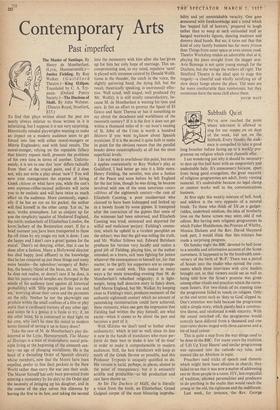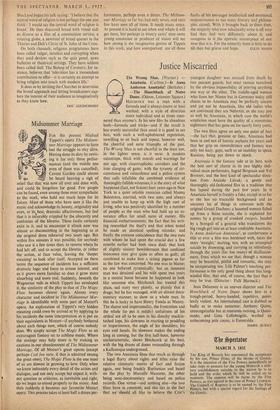Sabbath Quiet
WE'VE now reached the point where television is allowed to sing for our supper: on six days of the week, but not on the Sabbath. Every Sunday the audi-
o ence is compelled to take a good long breather before facing up to 'a weekly pro- gramme on religion which rival channels offer.
I am wondering just why it should be necessary' to dam up this half-hour with an unnecessary and undesirable halo. It's unnecessary because, apart from being good. evangelism, the great majority of religious programmes are adult, lively viewing material. It's undesirable because no legal clamp or content works well in the communications
business. • At first sight this weekly mixture of bell, book and telebox is the very opposite of a natural break. To those who think of TV ..as a gadget- ridden, underbred medium, the- idea of brotherly love on the home screen may seem, odd if not odious. But having seen religious programmes in which Father Huddleston, the Prioress of Whitby, Monica Dickens and the Rev. David Sheppard took part, I would think that this mixture has made a surprising progress. • .
On Sunday night the BBC devotedits half-hour to a sensible and informative accountof. the Scout , movement. It happened to be the hundredth. anni-
versary of the birth of There was a. patrol of Scouts into the studio• who• mimed the com- ments which three interviews with civic leaders brought out, so that viewers could see as well as being told how the Scout's promise was given among other rituals and practices which the move- ment fosters.' For two-thirds of•its running time the programme failed ,to touch. on religion. Only at the end terms such as 'duty to God' slipped in. One's attention was-held because'the programme told a simple story, which plainly,had a construe- tive theme, and reinforced it With sincerity. With the sound switched' off, the programme would . scorcely 'have differed from• a thousand and one interviews' shows staged with three ,eameras and a
bit of local' colour. -
This is quite a step from the way things used to be done at the BBC. For many years the .tradition of 'Lift Up Your Hearts' and similar programmes was squeezed into the cathode', ray- tube, and
treated like an Absolute in aspic. • .
Preachers used tricks of speech and rhetoric which might have been effective in church; they failed to' see that it was now a matter of addressing two or three -people in a room. ITV, less respectful, of tradition,- allowed personalities and producers to do anything in the studio that would reach -the young or the old, the righteous and-the indifferent.
Last week, for instance, the 'Rev. George MacLeod began his talk saying : 'I believe that the central word of religion is not perhaps the one you think : I would say the central word of religion is bread.' He then discussed bread with visual aids as diverse as a film of a communion service, a rotating globe, a newsreel of bread queues in the Thirties and Dali's Christ of St. John of the Cross.
On both channels, religious programmes have been called vulgar, tasteless and corrupting when they used devices such as the quiz panel, news bulletins or theatrical settings. They have seldom been called dull. The Bishop of Coventry, for in- stance, believes that 'television has a tremendous contribution to offer—it is certainly an attempt to bring religion into touch with modern life.'
It does so by inviting the Churches to determine the broad approach and letting broadcasters cap- ture the interest of their audience as imaginatively as they know how.
ERIC' GOLDSCHMIDT



































 Previous page
Previous page